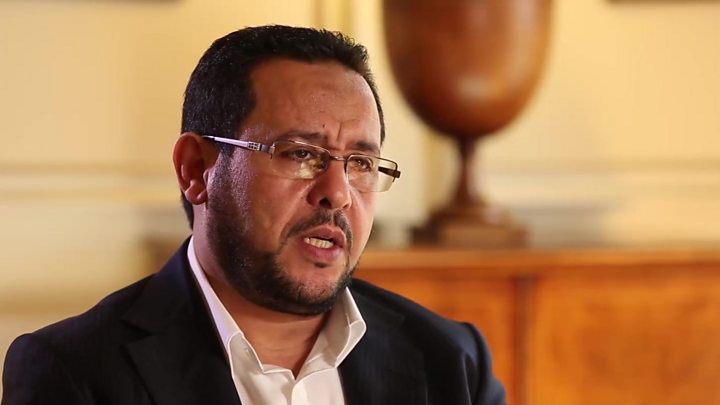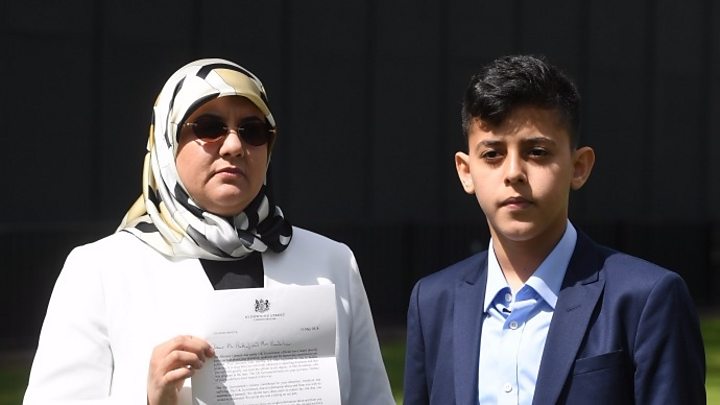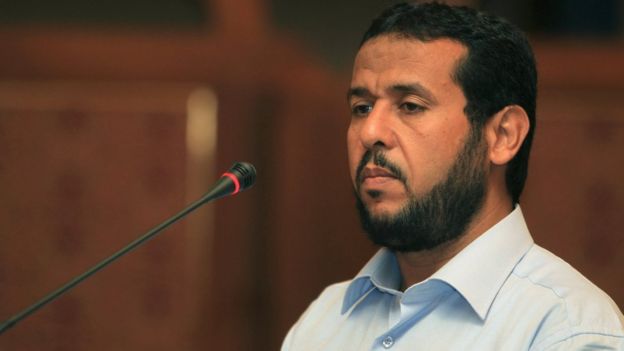Belhaj rendition: UK apology over Libyan dissident treatment

The UK government has apologised to a Libyan dissident and his wife after its actions contributed to their detention, transfer to Libya and his torture by Colonel Gaddafi's forces in 2004.
Prime Minister Theresa May said Abdul Hakim Belhaj and Fatima Boudchar had suffered "appalling treatment".
Ms Boudchar, who was pregnant at the time, has accepted Mrs May's apology and will receive a £500,000 payout.
The couple say an MI6 tip-off helped the US kidnap them in Thailand.
Mr Belhaj was taken to Tripoli and says he was tortured by his Libyan jailers during a six-year spell in prison. Ms Boudchar was also detained but was released shortly before giving birth.
Speaking to BBC News, he said the apology should serve as a "lesson" to governments not to repeat the couple's rendition.
"I hope that it is a new page in history, that we guarantee and strengthen human rights and this practice is not repeated which violated mine and my wife's rights."
Mr Belhaj added the six years the family waited for this was "an extension of the suffering for my family" on top of the years he was held captive.
In a letter read out in the Commons, Mrs May said UK actions had contributed to the couple's capture and that the government had "shared information" about them with "international partners".

The letter said: "It is clear that you were both subjected to appalling treatment and that you suffered greatly, not least to the dignity of Mrs Boudchar, who was pregnant at the time.
"The UK government believes your accounts. Neither of you should have been treated this way. The UK government's actions contributed to your detention, rendition and suffering. The UK government shared information about you with its international partners."
Mrs May said the UK "should have done more to reduce the risk" of the pair being mistreated, adding: "We accept this was a failing on our part. On behalf of Her Majesty's government, I apologise unreservedly."
Ms Boudchar, who travelled to the UK with her son Abderrahim to hear the statement in Parliament, described the day's events as "historic" and called on world leaders to show solidarity for those who have suffered injustice "even if they're of different religion or culture".

The documents that forced the UK to apologise
By Dominic Casciani
The settlement is the first time ministers have apologised for a specific act involving British security agencies.
Papers discovered in Tripoli, Libya - during the fall of the dictator Colonel Muammar Gaddafi in 2011 - included evidence of how MI6 and the CIA had groomed Gaddafi and his regime to come in from the cold.
The UK's plan was to convince Gaddafi to not only stop threatening the West, but to also provide intelligence on Libyan dissidents and their potential links to al-Qaeda.
Details of secret conferences and documents referring to Mr Belhaj have emerged and help illustrate how the rendition case developed.

'Humane' treatment assurances
Attorney General Jeremy Wright, who read out Mrs May's letter, said Mr Belhaj had not sought and would not receive financial compensation.
However, friends of the couple said the UK had agreed to pay Mr Belhaj and Ms Boudchar's "substantial" legal fees.
Jack Straw, foreign secretary at the time of the rendition case, issued a statement in which he said he had "sought to act at all times in a manner which was fully consistent with my legal duties, and with national and international law".
He said it had been part of his role to approve "a wide range of matters to protect our national security" including the sharing of information with international partners.
This included getting assurances that those concerned were being treated humanely, he said.
Who is Abdul Hakim Belhaj?
 AFP
AFP
Mr Belhaj was born in 1966 in the Souq al-Jumaa area of Tripoli and studied at al-Fateh University, where press reports say he earned a civil engineering degree.
He became an opponent of Libyan leader Col Muammar Gaddafi and commanded the now defunct Libyan Islamic Fighting Group which staged a low-level insurgency war and attempted to assassinate Col Gaddafi three times.
He fled the country in 2001 but was three years later abducted in Bangkok - along with his wife, then five-months pregnant - while attempting to fly to London to claim asylum in the UK.
Mr Belhaj is now a politician in Libya.
No comments:
Post a Comment